A summary of all 10 categories of the 2023 Ig Nobel Prize, which is recognized for 'research that makes people laugh and think,' and a Japanese person wins the nutrition award.

The 33rd (2023) award ceremony for the Ig Nobel Prize , which is given to research that makes you laugh and think, has been sponsored by the American scientific journal Improbable Research since 1991. was held on September 15, 2023 at 7:00 Japan time. In particular, Japanese people have been awarded the Ig Nobel Prize every year since 2017, and a Japanese researcher won the Nutrition Prize at the 33rd edition as well.
The 33rd First Annual Ig Nobel Prizes:
https://improbable.com/ig/2023-ceremony/
You can watch the award ceremony below. The Ig Nobel Prize award ceremony has been held at Harvard University's Sanders Theater, but due to the new coronavirus pandemic, it has been held online since 2019.
Ig Nobel Prize 2023 Award Ceremony Japanese version official distribution / The 33rd First Annual Ig Nobel Prize Ceremony [Japanese Subtitles] - YouTube
The theme of the 33rd Ig Nobel Prize was 'Water', and the host was held on a ship. The winner will receive a piece of paper that says ``I have won the Ig Nobel Prize'', 10 trillion Zimbabwean dollars, and a trophy. Please note that the Zimbabwe dollar was abolished as a currency in 2015, so the gift will not be a real bill, but data that can be enlarged and printed.

The trophies are printed out as PDF files and assembled by the winners themselves. In 2023, the box will be modeled after a Coke box (containing less than 12 bottles).

◆Chemistry/Geology Prize: For explaining why many scientists like to lick rocks.
The Chemistry and Geology Prize went to Mr. Jan Zalasiewicz from Poland and the United Kingdom.
Eating fossils | The Palaeontological Association
https://www.palass.org/publications/newsletter/eating-fossils
Zalasiewicz said geologists often lick rocks for visual reasons, such as when the surface of a rock is wet, particles on the surface are more visible than when it's dry. I showed that there is. There is also a record that Giovanni Arduino, an 18th century Italian geologist, actually used taste to identify minerals.

◆Literary Award: A study of the sensations we remember when we repeat a word over and over and over and over and over again.
Literary awards were presented to Chris Moulin, Nicole Bell, Melita Turunen, Irina Baharan, and Akira O'Connor from France, England, Malaysia, and Finland.
The induction of jamais vu in the laboratory: word alienation and semantic satiation: Memory: Vol 29, No 7
https://www.tandfonline.com/doi/abs/10.1080/09658211.2020.1727519
'Déjà vu' is when you suddenly feel as if you have experienced what you are currently experiencing in the past. The research team called ``jamevu'' the opposite of déjà vu, ``subjectively feeling something familiar as something unfamiliar,'' and investigated whether repeating the same words over and over again causes jamevu. I confirmed that. The results showed that when repeating the same word 30 times in one minute, two-thirds of the subjects reported that they had 'experienced jamev.'

Additionally, people who reported experiencing déjà vu in their daily lives were significantly more likely to report experiencing déjà vu, leading the researchers to suggest that there is a correlation between the two. .
◆Mechanical Engineering Award: For bringing a dead spider back to life as a mechanical magic hand
Mechanical engineering awards were presented to Ti Fe Yap, Zhen Liu, Anoop Rajappan, Trevor Simokus, and Daniel Preston from India, China, Malaysia, and the United States.
Necrobotics: Biotic Materials as Ready-to-Use Actuators - Yap - 2022 - Advanced Science - Wiley Online Library
https://onlinelibrary.wiley.com/doi/10.1002/advs.202201174
Preston's research team conducted an experiment in which the dead spider's muscles were moved using air pressure to grab objects like a crane in a crane game. You can understand what it actually feels like by reading the article below.
``Necrobot'', a spider corpse modified into a robot hand, appears - GIGAZINE

The magic hand using a dead spider was able to lift an object over 1.3 times its body weight, and the maximum grip strength was recorded at 0.35 millinewtons. The research team also confirmed that it was highly durable, with the legs able to open and close 1000 times.
The research team calls the field of robotics using dead spiders ``necrobotics,'' but this name was thought up by the entire research team. They considered other names, but in the end they settled on 'Necrobotics.' The research team commented, ``We hope that the new field of necrobotics will lead to research that stimulates curiosity and ideas for applying it to robotics in a sustainable manner while respecting ecological materials.'' Did.

◆Public Health Prize: Invention of the Stanford Toilet, which is equipped with a variety of technologies to quickly analyze human excreta, including test strips for urine tests, an image analysis system for excrement analysis, an anal authentication sensor, and an online system.
The Public Health Prize was presented to Park Seung-min from South Korea and the United States.
Passive monitoring by smart toilets for precision health | Science Translational Medicine
https://www.science.org/doi/10.1126/scitranslmed.abk3489
Digital biomarkers in human excreta | Nature Reviews Gastroenterology & Hepatology
https://www.nature.com/articles/s41575-021-00462-0
Mr. Park has devised a smart toilet that can constantly check the condition of excrement and anus and monitor health care by attaching various sensors and cameras to the toilet. By using smart toilets, Park can test for the new coronavirus, norovirus, dysentery bacteria, etc., and aggregate and analyze data to help health authorities understand disease outbreaks in real time. It says that it will be.

Smart toilets have been considered since the 1970s, and it has been reported that various companies are promoting the practical implementation of smart toilets.
Development of a ``smart toilet'' that thoroughly manages the health of people who relieve themselves using the latest technology is progressing - GIGAZINE

'Thank you for this honor. Don't forget to put your poop to good use,' Park said, sitting on a toilet seat in front of a statue of 'The Thinker' by Auguste Rodin.
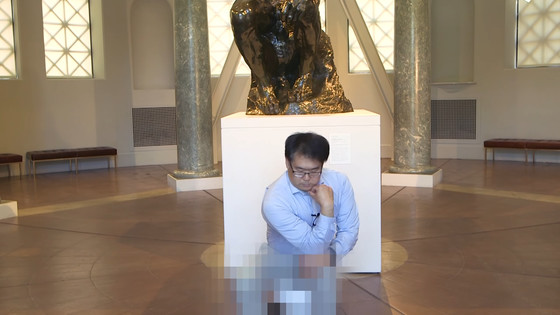
◆Communication Studies Award: Research on the mental activities of people who are experts in upside-down words
María José Torres Prioris, Diana López Barroso, Estela Cámara, Sol Fittipaldi, Lucas Cedeño, Agustín Ibáñez, and Marcello from Argentina, Spain, Colombia, Chile, China, and the United States. The Communication Studies Award was presented to Mr. Berthier, Mr. Adolfo Garcia, and others.
Neurocognitive signatures of phonemic sequencing in expert backward speakers | Scientific Reports
https://www.nature.com/articles/s41598-020-67551-z
According to the research team, in some regions of Spain, there is a culture where people intentionally speak backwards, and not just one word, but rather long sentences. It turns out that the people who spoke this backwards language contained unique patterns in the neural circuits involved in auditory and visual processing. The research team says, ``In order to understand the mechanism of mental activity that understands ordinary words, we tried to understand the mechanism when speaking upside down words.''
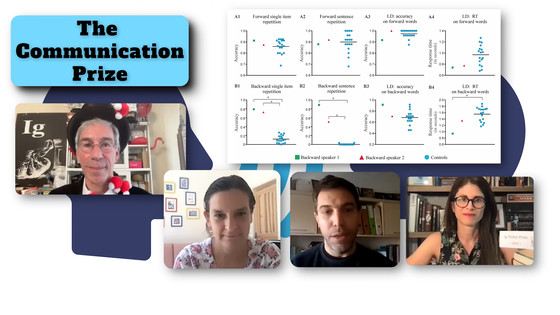
◆Medical award
The medical award goes to Christine Pham, Bobak Hedayati, Kiana Hashemi, Tiana Mamagami, Ella Chuka, Margit Juhaj, and Natasha Masinskovska from the United States, Canada, Macedonia, Iran, and Vietnam. The award was given to ``research using cadavers to determine whether the number of hairs on both sides of the nose is the same.''
17958 The quantification and measurement of nasal hairs in a cadaveric population - Journal of the American Academy of Dermatology
https://www.jaad.org/article/S0190-9622(20)32002-8/fulltext
Alopecia can be seen not only in the hair, but also in the eyelashes, eyebrows, and nose hair. It is generally believed that nasal hair 'prevents foreign substances such as pathogens from entering,' but the research team says there has been no research on whether people who lose nose hair due to alopecia are at increased risk of contracting the disease. About. He also said that since the body is basically asymmetrical, he was interested in whether the number of nose hairs was also asymmetrical, which motivated him to do the research.
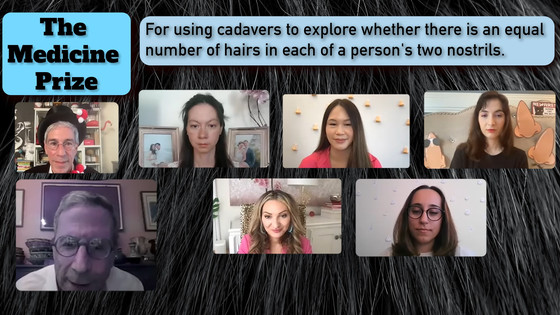
The research team counted the nose hairs of about 20 cadavers and found that on average there were 120 nose hairs on the left side and 112 on the right side, with slightly more on the left side. We also found that hair grows in front of the nose and only grows to a height of 0.81 to 1.035 cm. Based on this, the research team argues that the hypothesis that nose hair is used to prevent invasion from the outside is more likely.
◆Nutrition Prize: An experiment that investigated how chopsticks and straws change people's sense of taste using electrical stimulation.
The Nutrition Award was presented to Professor Yoshiaki Miyashita of Meiji University and Project Associate Professor Hiromi Nakamura of the University of Tokyo. This is the 17th consecutive year that a Japanese person has won this award since 2007. Professor Miyashita and Specially Appointed Associate Professor Nakamura are conducting research on mechanisms for electrically manipulating taste, and in 2016 they developed a fork that uses electricity to manipulate taste to make people feel salty.
Will an 'electric fork' that changes the taste of food by passing electricity through it revolutionize a diet high in salt? -GIGAZINE

This technology is useful, for example, for people who are forced to eat a low-sodium diet due to illness. Low-salt foods have a weak salty taste, so they don't taste very good, and they have a big impact on patients' mental health. If we could manipulate our sense of taste with electricity, we would be able to enjoy low-salt foods.
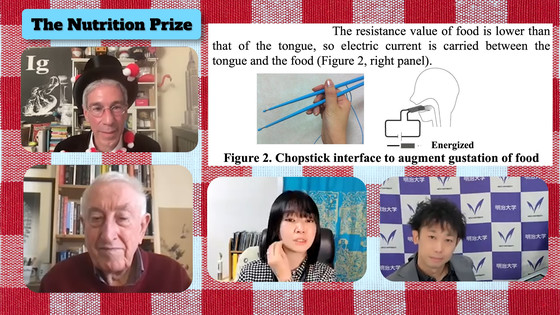
It has been reported that Kirin and Meiji University are already proceeding with development in 2022. Professor Miyashita also revealed that he has begun research into 'taste media,' a technology that remotely conveys taste.
Kirin and Meiji University succeeded in developing a ``chopstick-shaped device that enhances salty taste by 1.5 times'' - GIGAZINE

At the award ceremony, Professor Miyashita announced that he plans to release a device called 'Electric Salt' in 2023 that manipulates taste through electrical stimulation.
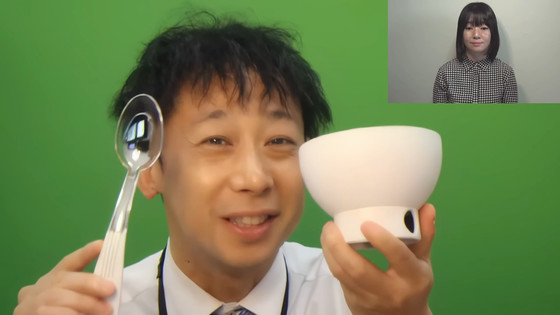
◆Education Award: Systematic study of teacher and student boredom
Hong Kong, UK, Netherlands, Ireland, USA, Canada, Japan Katie Tam, Sayanya Poon, Victoria Hue, Winan Van Tilburg, Christy Wong, Vivian Kwan, Gigi Yuen The Educational Award was presented to Mr. Christian Chan and others.
Whatever will bore, will bore: The mere anticipation of boredom worsens its occurrence in lectures - Tam - 2023 - British Journal of Educational Psychology - Wiley Online Library
https://bpspsychub.onlinelibrary.wiley.com/doi/abs/10.1111/bjep.12549
Boredom begets boredom: An experience sampling study on the impact of teacher boredom on student boredom and motivation.
https://psycnet.apa.org/record/2019-43511-001
The research team asked 437 students and 17 teachers at a secondary school in Hong Kong to keep diaries for two weeks to record the level of boredom in their daily lessons. Students also rated how bored they perceived their teacher to be and how motivated they felt during class.
The results also showed that when teachers themselves were bored with teaching, teacher boredom affected students, reducing student motivation. Teachers tend to get bored with teaching because they have to teach the same lessons every year, and this may be the cause of boredom for students.

◆Psychology Prize: An experiment to find out how many passersby are tempted to look up when they see a stranger looking up on the street.
The psychology award went to Americans Stanley Milgram, Leonard Bickman, and Lawrence Berkowitz.
(PDF) Note on the Drawing Power of Crowds of Different Size
https://www.researchgate.net/publication/232493453_Note_on_the_Drawing_Power_of_Crowds_of_Different_Size
The research was conducted in 1968, and the research team was led by Stanley Milgram, known for the `` Milgram experiment ''. Mr. Milgram passed away in 1984, so Mr. Bickman, who was a seminar student, received the trophy in his place at the award ceremony.
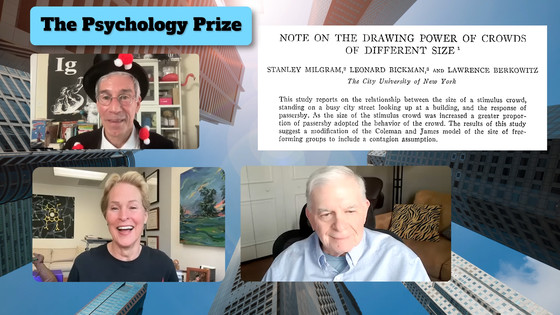
Mr. Milgram had 1 to 15 seminar students stand on 42nd Street in Manhattan, a busy street with many passersby, and had them look up at random moments, then observed them from the 6th floor of a nearby building.
If only one seminar student looked up, only 4% of the 1,425 passersby who walked down 42nd Street stopped to look up at the sky. However, when the number of seminar students looking up was increased to 15, 40% of passersby stopped. Also, including those who looked up without stopping, 42% of passersby looked up when there was only one seminar student, and 86% when there were 15 seminar students.
◆Physics Prize: How much does the sexual activity of anchovies affect ocean mixing?
Mr. Vieto Fernández Castro, Mr. Marian Peña, Mr. Enrique Nogueira, Mr. Miguel Gilcoto, Mr. Esperanza Bourlon, Mr. Antonio Comasaña, Mr. Demian Bouffat, Mr. Alberto The Physics Prize was awarded to Navela Galabato and Beatriz Morinho Calbarido for their research.
Intense upper ocean mixing due to large aggregations of spawning fish | Nature Geoscience
https://www.nature.com/articles/s41561-022-00916-3
Ocean mixing is the mixing of the upper and lower layers of the ocean, which greatly affects the balance of nutrients in the ocean. Until now, it has been debated that ocean mixing may be influenced by the activities of marine organisms.
The research team conducted a survey in 2018 and found that when large numbers of anchovies swim in schools while mating during the spawning season, the dissipation of ocean currents increases by 10 to 100 times the normal amount. This suggests that the sexual activity of anchovies may be causing ocean mixing.
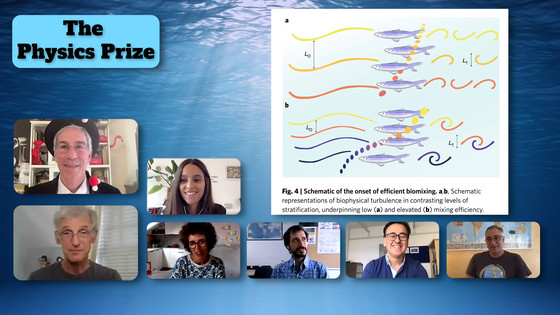
Related Posts:







